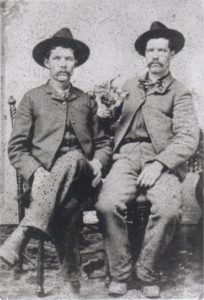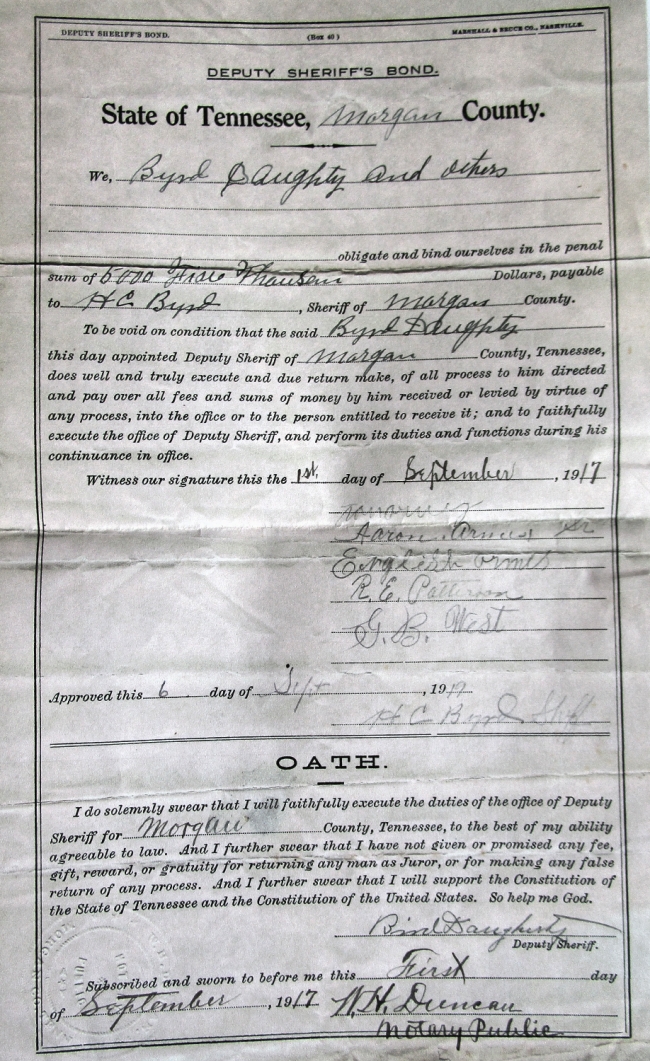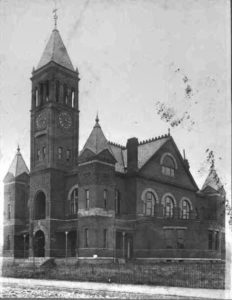Deputy Byrd Daugherty1)In various places and sources, Byrd’s name is often spelled “Bird.” The way I was told, the correct spelling is Byrd. Another point: The last name, Daugherty, has also been spelled Dougherty. never reckoned that a bloodbath was coming when he stepped off the train from the Harriman and Northeastern Railroad and onto Petros, Tennessee, soil. The day was Sunday, April 9, 1922, and the afternoon was bright and clear. People presumably milled about, dressed in their Sunday best, socializing and enjoying the beautiful, spring afternoon. Perhaps a light breeze drifted across the land, permeating the air with fresh, sweet honeysuckle or spicy wild ginger. Blooms like blue phlox wagged calm and easy, and Solomon Seal fluttered to and fro like modest little bells.

Byrd was probably dog-tired (no pun intended). Oh, he may have dozed off here and there on the passenger train, but probably longed for a good night’s sleep in his own bed beside his devoted wife. He had spent the previous night in Anderson County’s seat, Clinton, Tennessee. He purportedly stayed with the sheriff of the county after making an arrest and transporting the prisoner to Clinton’s jail. One thing I’ll say to bring a further sliver of foreshadowing to this whole thing: Byrd Daugherty arrested the wrong person in the wrong way at the wrong time. I’m not saying the arrest was wrong. Given the Prohibition law, it was warranted. As it was, Byrd found himself back on his home soil. I imagine he looked at his pocket watch – about 1:00 p.m. – and likely turned to make his way on foot to his home in New River. Just a little way into his walk and his eyes caught the reassured faces of his two sons, Fisher and William. The young men were troubled by their father’s absence the previous night. The three made their way on the path home.
Byrd Daugherty was born on February 22, 1867 to William and Martha “Patsy” Daugherty. He was probably born in Anderson County, Tennessee. Many of the Daughertys in my line come from three counties: Anderson, Morgan, and Scott. They lived in lands full of gorgeous woodlands and green pastures flanked by mountains on all sides; where bluffs or palisades jut from mountain faces, and hollers, deep and shadowed, wind around and spread out like blue veins in a body. The region caught the Daugherty eye hundreds of years ago. A mountain exists there, Fork Mountain, that was once called “Daugherty Mountain.”
Back in the day, jobs for mountain men were really quite limited. The average working man was a miner, a farmer, or a merchant of some sort. Some were loggers and railroad workers. According to the census, Byrd’s father was a farmer. His mother, like all women in that era, was listed as “homemaker” or “housekeeper.”
Also according to census information, Byrd did not attend school, yet he could read and write. So, he either received some unreported education or was self-educated. On July 17, 1890, Byrd married Mary Bunch in Anderson County. The couple had at least eight children: Byrd Jr., Fisher, Dedric, William aka “Willie,” Robert, Noah, Martha, and Blane (also Blaine). Some sources say they had more children.

Byrd worked a number of jobs throughout his life.2)Byrd has two death certificates, which seems more than a little strange, except the place of his death is still debatable. A certificate from Morgan County, Tennessee, lists his occupation as coal miner. A certificate from Anderson County, Tennessee lists a different, illegible occupation – a foreman, lawman, frameman (?). He was a farmer, a railroad worker, a coal miner(?), and a sheriff’s deputy.3)One source says Byrd was once the sheriff of Anderson County, Tennessee, but I found nothing to verify that information. As far as I can tell, he was always a deputy. One thing to note about lawmen back then. The pay sucked. A deputy didn’t make enough money to make ends meet and typically supplemented his income through other employment. Byrd was no different. He worked a separate job while employed in law enforcement. Well, he was certainly a deputy sheriff for Anderson County.
But, according to a 1917 Deputy Sheriff’s Bond, a “Bird Daugherty” took an oath “to execute the duties of Deputy Sheriff for Morgan County, Tennessee” as well. Byrd probably knew and experienced the dangers of that profession back then, but I surmise he considered himself an intimidating figure who believed nobody in their right mind would kill him. I think he never really thought he’d die from the hand of a gun.
To be sure, a lawman in the 1920s watched his back wherever he went. But a mountain lawman in the 1920s had to have eyes in the back of his head, a pistol at his hip, another at the shoulder, and a boot knife at the ready. Liquor was king and the mountains were its palace and stronghold. Yet, as we all know, the drink was also illegal. A steady workforce of highlander men kept the supply running, and our government made certain that a steady workforce of lawmen worked to destroy it all.
The Federal Government hired gangs of new special agents to assist in tracking down the stills and “stillers,” and in some counties the sheriffs became fired with the “Prohibition fever” and assigned gangs of deputies to assist the agents. These heavily armed teams of local and national peace officers traversed hill and mountain in a never-ending campaign to destroy the stills and to arrest their operators.(Night Comes to the Cumberlands by Harry M. Caudill, Boston: Little, Brown and Company. p. 153)
The powers that be gave these officers the authority to arrest, browbeat, and terrorize bootleggers; and the badge shielded them from repercussion. Once again, Byrd was no different. Yet, some information I’ve gathered suggests the job gave him a sense of superiority – and he sometimes overstepped his bounds. Yet we all hide things, don’t we? Byrd may have pursued lawbreakers because he himself knew all-too-well about crime and sin.
A November 1, 1913, article in the newspaper Anderson County News entitled “Sentence Affirmed: Bird Dougherty to Spend Three Years in Pen” details a murderous incident at a railroad site. The article states that Bird Dougherty, “a former county sheriff,” murdered an African American railroad worker named John Mackie. Apparently, Mackie told Bird he couldn’t work that day because he was sick. A conflict ensued. Bird claimed Mackie came at “him with a pick handle” so he shot and killed the man in self-defense. He was sentenced to “serve three years in the state prison for murder.” The case went to the Tennessee Supreme Court and they upheld the decision. I am currently investigating this incident. So far, no concrete information links this “Bird Dougherty” to the “Byrd Daugherty” in this series. At face value, the article has some good parallels. The perpetrator was “a former county sheriff.” The incident occurred at a railroad site – and Byrd Daugherty had worked as a “laborer” for the railroad.

Whatever happened, Byrd picked right back up and resumed work as a lawman. And here he was, an Anderson County badge on his person, walking home on this fine day with two of his sons. Another person, Pryor Bunch, reportedly joined them on their journey. A passerby might have noticed both sons’ uneasiness on the walk. Turns out they had plenty to worry about. As a matter of fact, the arrest Byrd Daugherty made the previous day was one of his own kin, twenty-five-year-old Watson Daugherty, apprehended for “transporting whiskey.” Gunfire was exchanged between Watson and the law. Police seized five gallons of moonshine and Watson was hauled off to the Clinton jail. Now, that’s where things become a little sketchy. Family lore says that when Watson was a teenager, he was arrested over moonshine and beaten half to death. Some sources say the persons who beat him were none other than Byrd’s sons, Fisher and Willie Daugherty. Though I don’t know if this lore is true, it’s interesting to note that Watson’s family “declared they would kill the officer [Byrd] for making the arrest.”
Watson’s father was Daniel Britton Daugherty, a well-known moonshiner in the mountains. Apparently, Daniel’s family was a favorite target for Byrd and his sons. After this arrest, Daniel was fit to be tied. This one was the match in the powder barrel. He is believed to have said that he’d put a stop to the continued mistreatment of his family. Several newspaper sources claim that Byrd wasn’t on his way home at all. They claim he was coming for Daniel Britton Daugherty’s other son Walton. If that’s true, Daniel must’ve been in fierce protective mode.
These two Daugherty families were no strangers, however. Bear with me now. I’ll do my best to explain the connections. Ell Daugherty is my 5th great grandfather. He had a son named William – Byrd’s father. Ell had a brother named Noah – Daniel Britton Daugherty’s father. So, they were cousins, but one could argue fairly close since Byrd’s uncle was Daniel’s father. Now, if I haven’t caused your noggin to joggle around, let’s get back to Byrd’s walk with his sons.
They hadn’t walked far, maybe less than a quarter of a mile, when they spotted figures up ahead. They couldn’t make out who the figures were . . . until they were at a fairly close distance. Byrd Daugherty, his sons, and Pryor Bunch stood motionless. There in front of them were Daniel Britton Daugherty, Robert Lowe, and sources say one or two other men. Their eyes were furious and hungry. Robert Lowe reached into his pocket, pulled out a piece of paper, and shook it unfolded.
“I got a warrant for arrest,” he said.
Sit tight because there’s more to come in this Daugherty series!
**Featured image from pxfuel.com
Sources Used:
- Anderson County Sheriff’s Department. n.d. “Deputy Sheriff Bird Daugherty.” Officer Down Memorial Page. Accessed Jun 7, 2018.
- Anderson County, Tennessee. 1890. Record of Marriages. Vital Records, Ancestry.
- Caudill, Harry M. 1963. “Moonshine and Mayhem.” In Night Comes to the Cumberlands, by Harry M. Caudill, 153-164. Boston: Little, Brown and Company.
- Find-a-Grave. 2011. Byrd Daugherty. Sept 7.
- Shown, Pamela. n. d. “Descendants of William Daugherty.” Genealogy.
- State of Tennessee State Board of Health . 1922. “Bird” Daugherty Death Certificate. Bureau of Vital Statistics, Anderson County: Family Search.
- State of Tennessee. 1852. Tennessee Marriage Records. Anderson County: Ancestry.
- State of Tennessee, Morgan County. 1917. “Deputy Sheriff’s Bond.” Nashville: Marshall & Bruce Co., Sept 6.
- Tennessee State Library and Archives. 2011. sharetngove.tnsosfiles.com.
- United States Federal Census. 1920. Fourteenth Census of the United States. United States Federal Census, Anderson County: Family Search.
- United States Federal Census. 1850. Free Inhabitants in District No. 18 in the County of Scott, State of Tennessee. Census, Scott County: Family Search.
- United States Federal Census. 1860. Free Inhabitants in the County of Anderson, State of Tennessee. Census, Anderson County: Family Search.
- United States Federal Census. 1870. Inhabitants in the Tenth (10) District in the County of Anderson, State of Tennessee. Census, Anderson County: Family Search.
- United States Federal Census. 1880. Inhabitants in the Tenth (10) District in the County of Anderson, State of Tennessee. Census, Anderson County: Family Search.
- United States Federal Census. 1910. Thirteenth Census of the United States. Census, Rosedale, Anderson County: Family Search.
- United States Federal Census. 1900. Township or other division of county 10 Civil District. Census, Anderson County: Family Search.
Newspapers:
- Anderson County News “Bird Dougherty to Spend Three Years in Pen,” November 1, 1913. Murder and Mayhem in Campbell County.
- Chattanooga Daily Times “Unknown Men Kill Deputy, two Sons” 10. Ancestry. April 10, 1922.
- Chattanooga Daily Times “Slayers of Three in County Jail” – Ancestry, Sharon Witt 937 April 14, 1922 p. 5.
- Chattanooga Daily Times “Daugherty, Lowe Allowed Bond]” – Ancestry, Sharon Witt 937 April 28, 1922 p.8.
- The Chattanooga News “Deputy and Two Sons Murdered,” Ancestry. April 10, 1922.
- The Commercial Appeal Memphis, Tennessee “Deputy and Two Sons Killed on Roadside,” Ancestry. April 10, 1922.
- The Journal and Tribune “Slayers of Three Ordered Taken to Chattanooga Jail for Safe Keeping After Bail is Denied by Justices,” April 13, 1922 – Ancestry
- The Journal and Tribune “Slayers of Three Daughertys Win Contention” April 27, 1922. Ancestry.
- The Journal and Tribune “Slayers of 3 Make Big Bond,” April 28, 1922 – Ancestry, SharonWitt937
- Knoxville Journal “Three Dead by Unknown Hands,” April 10, 1922 p. 1. East Tennessee Historical Society
- Knoxville Journal “Two Held After Three Killed,” April 11, 1922 p. 5. East Tennessee Historical Society.
- Knoxville News “Arrests Two Men for Triple Murder: Dan Daugherty and Robt. Lowe are Captured,” April 10, 1922. Library of Congress, Chronicling America.
- Knoxville News “Daugherty Slayers Sentenced for Life,” October 23, 1923 p. 7. Library of Congress, Chronicling America.
- Knoxville Sentinel “Captured by Anderson County Sheriff as They are About to Leave in an Auto Near Clinton,” April 10, 1922 p.1. – Ancestry, SharonWitt937
- Knoxville Sentinel “Taken Back to Morgan County,” April 10, 1922 p.6 – SharonWitt937, Ancestry
- Knoxville Sentinel “Habeas Corpus Hearing in Effort to Release Two Charged with Murder” Ancestry. April 24, 1922 p. 6. Library of Congress, Chronicling America.
- Morgan County Press “Bird Daugherty and Two Sons Fisher and William Killed Near Petros” April 14, 1922. Library of Congress, Chronicling America.
- Morgan County Press August 18, 1922. Library of Congress, Chronicling America.
- Morgan County Press “Daugherty and Lowe Given 21 Years,” August 18, 1922. Library of Congress, Chronicling America.
- Morgan County Press “Town Topics” [last paragraph] April 28, 1922. Library of Congress, Chronicling America.
- Morgan County Today “Triple Tragedy Near Petros 100 Years Ago,” Jean Pollard, April 23, 2019, p. 5. Print.
- Nashville Banner “Arrests Follow Triple Killing,” April 10, 1922 p.1 – Ancestry, SharonWitt937
- Nashville Tennessean “Lowe and Daugherty get 25-Year Terms,” October 23, 1923 p. 11.
- Nashville Tennessean “State Supreme Court . . . Affirms Murder Verdict” November 3, 1924 (p. 7.
- Roanoke Rapids Herald, North Carolina, “Alleged Slayers Caught,” April, 1922. Library of Congress, Chronicling America.
Historical Societies:
- Morgan County Genealogical & Historical Society
- East Tennessee Historical Society
- Campbell County Historical Society
- Anderson County Archives
References
| ↑1 | In various places and sources, Byrd’s name is often spelled “Bird.” The way I was told, the correct spelling is Byrd. Another point: The last name, Daugherty, has also been spelled Dougherty. |
|---|---|
| ↑2 | Byrd has two death certificates, which seems more than a little strange, except the place of his death is still debatable. A certificate from Morgan County, Tennessee, lists his occupation as coal miner. A certificate from Anderson County, Tennessee lists a different, illegible occupation – a foreman, lawman, frameman (?). |
| ↑3 | One source says Byrd was once the sheriff of Anderson County, Tennessee, but I found nothing to verify that information. As far as I can tell, he was always a deputy. |

fascinating series!
One question: How do you pronounce Daugherty?
I’ve heard at least 4 different pronunciations, depending on area. Given that my maiden name is Copley, which is only pronounced correctly in one place in the whole country (Boston), I like to know how people say their own name.
Is it Dock-er-tee? Dow-er-tee? Doh-er-tee? Dah-her-tee? Or are there even more pronunciations? Thanks!
Hello Debra!
I’m glad you liked the series. The pronunciation of Daugherty varies depending on the location. I address the name a little in an article called “The Blood of Dochartach“. The Dochartach is the very first variant from (at least) 1500 or so. From the article: “The Ó Dochartaigh (the original old Irish spelling) name translates to ‘descendant of Dochartach.’ The Ulster dialect weakens the “ch” in the name ‘to an “h” sound,’ to be pronounced, ‘Oh-DAH-her-tee.’ My family pronounces it like “Darty.” I also think spelling is another element. Doughty is sometimes either “doe-tee,” “dow-dee” or “dah-tee.” Dougherty is often “dow-er-tee.” In almost all cases, the h is silent. I hope my wordy nerdiness answers your question. Let me know what you think!
How fascinating. I live in Pennsylvania, up in the very top where there are few people and things are often a little different. The family here pronounce their name DOCK-er-tee, but I think probably it got messed up at some point by immigration. I love wordy nerdiness, and can talk word origins and names for hours.